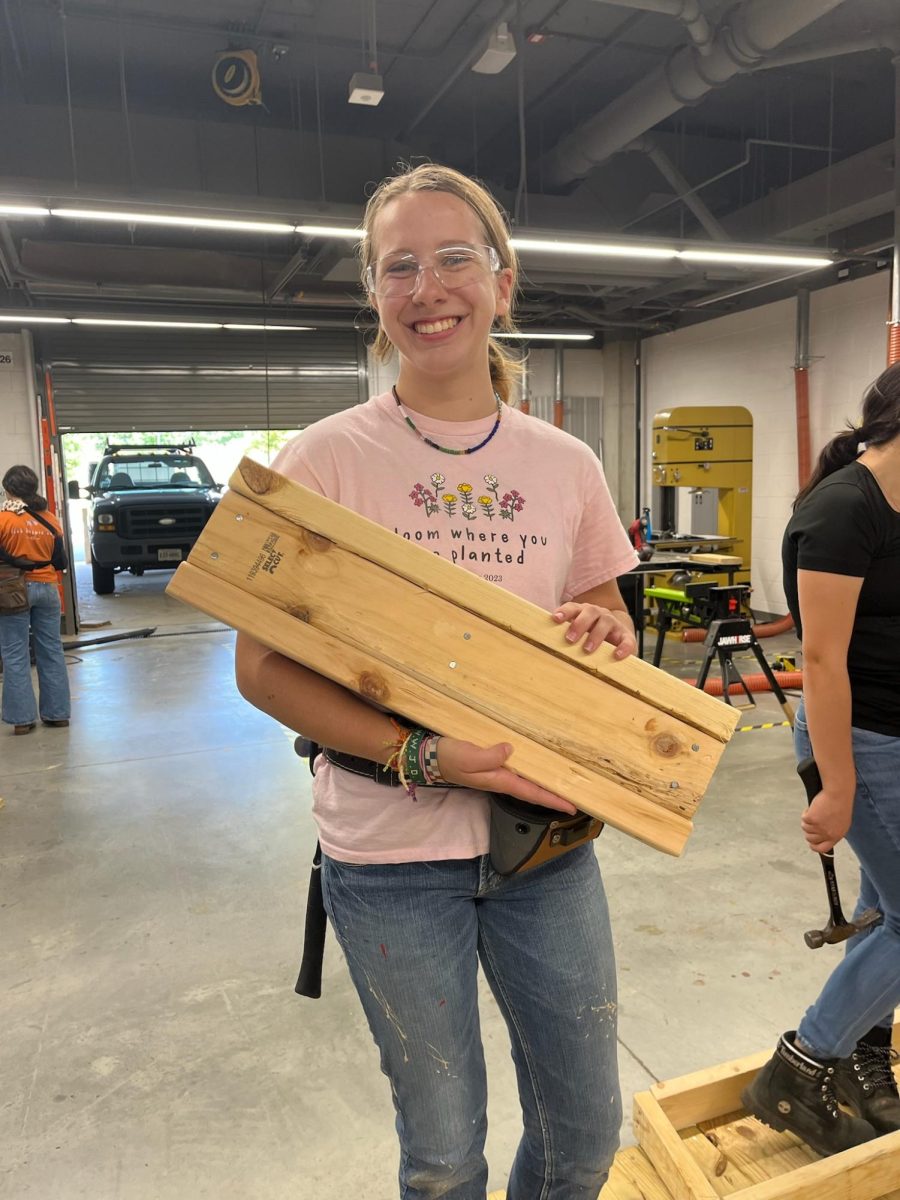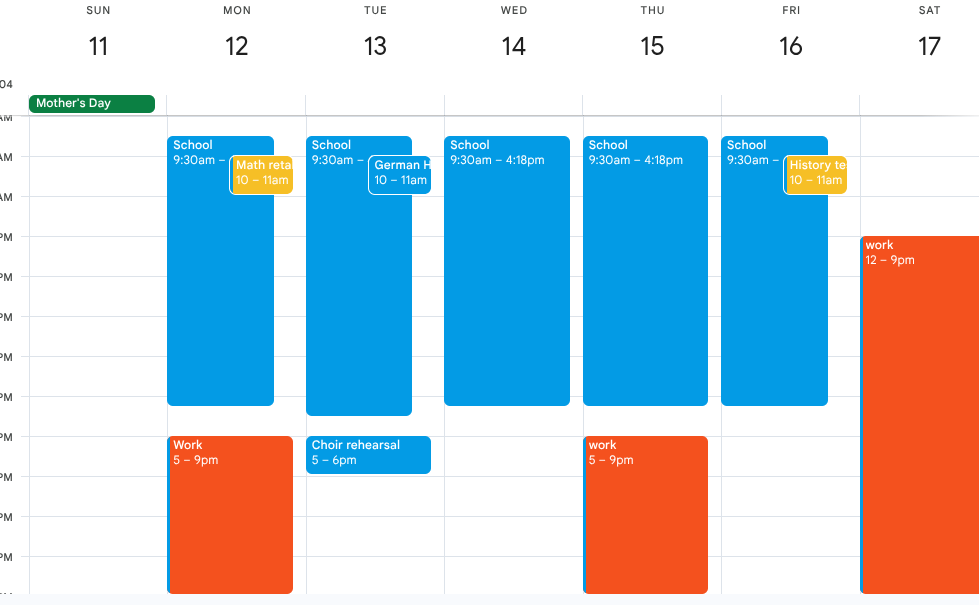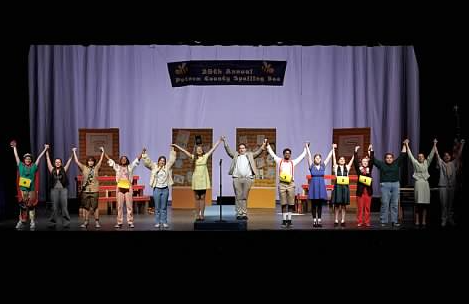Rebekah “Bekah” Hunt has shoulder-length blond hair and often wears a beaded necklace along with a bright smile to meet the day. However, there’s a few other things that differentiate her from others, one of them being her eyes. Not necessarily that they’re blue and brown, but more so their intensity, drawn out by her analytical and problem-solving nature. Perhaps because of this side of her, she chose to pursue a construction based career, structuring her schedule so she can graduate a year early. As she discussed how she narrowed in on construction as a field she is interested in, she said, “I like the hands-on aspect and being able to know that I’m creating stuff because it gives you that satisfaction.”
During sophomore year, Hunt realized that she could go through high school without taking junior year and still achieve her goal. A year later, as a senior, she says that her ability to graduate early was helped by, “The fact that I could take online courses and I only needed two online courses seemed pretty easy, which it was.” With her heart set on a hands-on career, Hunt only saw the need to get a standard diploma, so she only needed 6 more credits to graduate early.
Both civil engineering and construction careers both equally interest Hunt. “But I may just try my hand at getting into the trades construction and electric… and figure out where I want to go from there,” she says. In Hunt’s words, civil engineering is “…the blueprints, figuring out what needs to happen, where it needs to happen, and speaking to the big people…” Basically, “Civil engineering is the big man behind the scenes who prepared and made everything.” Meanwhile, construction consists of, “Doing the labor and actually implementing the plan.”
In order to prepare herself for her career choice, Hunt took a building and construction class at the Academies of Loudoun (ACL). The ACL class “…helped a lot to… cement that’s what I want to do,” she explained, laughing at the unintentional joke. She had originally planned to go to college after, somewhere like Northern Virginia Community College (NOVA) or `Brigham Young University (BYU) to take construction, welding, math, and other educational courses. However, because she decided on her career path, she has recently been receiving job offers. This turnabout is because construction is a high demand job, accompanied with the fact that her particular field is more willing to hire female workers in order to seem more equal. Furthering the description, Hunt also explained that she would be paid higher wages because of the latter reason.
Despite being faced with so many options, Hunt says she’s excited to graduate early so she can get ahead, start earning money, and “…survive in this economy.” She advises other students who are considering what to do for college that, “You have to know what you want to do and where you’re thinking of going because I definitely think graduating early is very possible and is a very good thing for people to do because you don’t need to be in high school for 4 years.” Despite encouraging others to graduate early, she believes that, “If you want to go to college, you have to be dedicated to what you’re doing.”
Had Hunt known that she would be pursuing a path that would make her graduate early, she would have prioritized her classes differently. Instead of taking Spanish 4, she would have taken a personal finance class instead so she would have room for electives or another math class. Despite claiming that school is “…not the way I learn,” Hunt misses taking math classes. She appreciates the real-life applications of mathematics and it helps her in her career. “Math is a very easy subject to make hands-on… It’s more applicable to my life because I like figuring out distances of things,” she explains.
Another thing that Hunt will lose out on, rather obviously, is what would have been her last year of high school had she taken junior year. “It will be harder to stay connected with my friends,” she says. Even though she will still be around and see some of her friends in her last year of seminary, a morning scripture study class with her church, she still notices the loss. “Sometimes it’s hard to stay in contact with people if you’re not seeing them every day.” However, Hunt says that overall high school “…just kind of taught me that there’s some people you want to keep and there’s some people who you just can’t because everyone’s on their own path and either they’re trying to compete with you or they’re trying to help you.” So while she will miss her friends that she can’t keep in touch with, she understands that everyone has their own course in life. In the end, she discloses high school “…tries patience, that’s what I’ve learned.”
Even though Hunt has mixed feelings about graduating early, she most certainly doesn’t regret it. While she would have prioritized her classes differently, she has still immensely enjoyed her ACL class. “I think it’s funny because I’ve learned more about life in construction class than I have in school,” she acknowledges. “I’ve learned more random things in my construction class… We talked about palindromes one day in construction. Like we were literally learning English and sometimes we have little history lessons.”
Hunt doesn’t know exactly where she wants to go next even though she knows what she wants to do. “College isn’t always necessary,” she says, aware that trade school, military, and other options exist. Nevertheless, she still sees value in pursuing goals in college. “It just depends on what you want to do and figuring out if you want debt or not,” Hunt says, half serious. Whether she goes to college or directly into the workforce, pursues construction or civil engineering, she says that life after high school is “…figuring out what you want to do and finding either your passion, your calling, and going along with it.”






